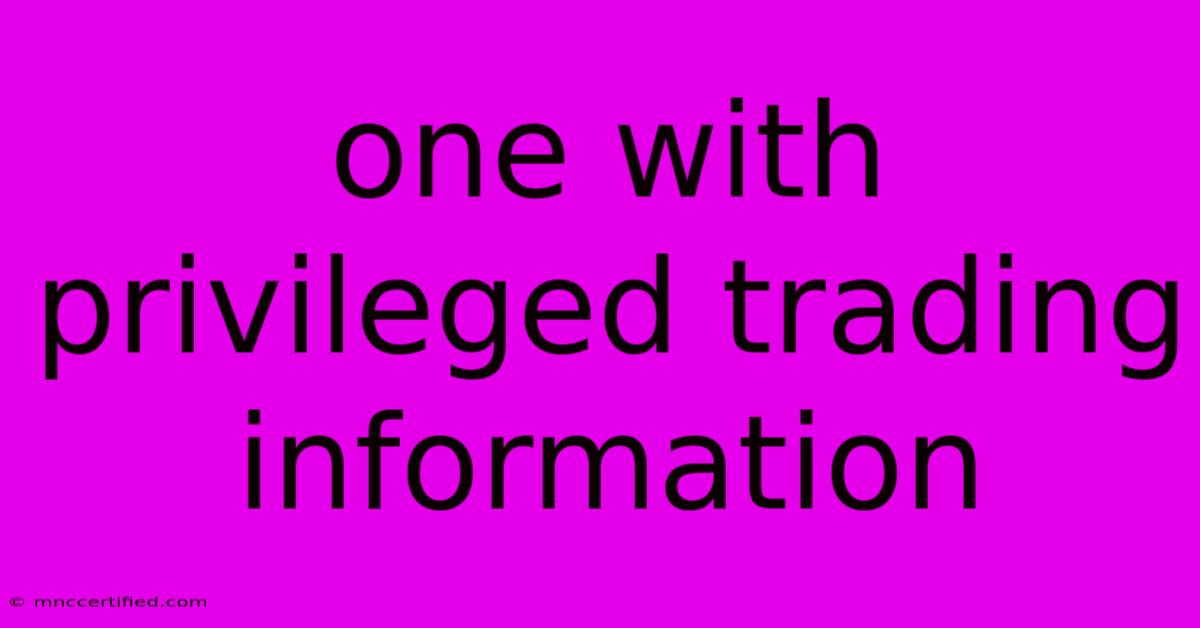One With Privileged Trading Information

Table of Contents
The Perils of Insider Trading: When Information Becomes a Weapon
The allure of "insider information" – confidential knowledge that could give an edge in the financial markets – is a siren song for some. But the path of insider trading is paved with legal pitfalls and ethical dilemmas. This article delves into the world of privileged trading information, exploring its dangers, consequences, and the ethical considerations that should guide your actions.
What is Insider Trading?
Insider trading occurs when someone uses non-public information, often obtained through their position in a company or through illegal means, to gain an unfair advantage in the stock market. This information can include anything from upcoming mergers and acquisitions to product launches and financial reports.
Why is Insider Trading Illegal?
Insider trading is illegal for several key reasons:
- It undermines market fairness: Insider trading gives individuals an unfair advantage over others who don't have access to the same information. This disrupts the level playing field and can lead to market manipulation.
- It erodes investor confidence: If investors believe that the market is rigged by insiders, they are less likely to participate. This can lead to a decrease in liquidity and ultimately harm the overall economy.
- It can harm the company: When insiders use non-public information to profit, it can damage the company's reputation and erode shareholder trust.
The Consequences of Insider Trading
The penalties for insider trading can be severe, ranging from fines to prison time. The Securities and Exchange Commission (SEC) and the Department of Justice (DOJ) actively investigate and prosecute insider trading cases.
Here are some of the potential consequences:
- Criminal charges: Individuals convicted of insider trading can face substantial fines and prison sentences.
- Civil penalties: The SEC can impose civil penalties on individuals and companies involved in insider trading.
- Reputational damage: Even if you are not convicted, insider trading allegations can damage your reputation and make it difficult to find future employment.
Ethical Considerations
Beyond the legal ramifications, insider trading raises serious ethical concerns. It violates the principles of fairness, honesty, and integrity. It's important to remember that the financial markets should be a level playing field where all investors have an equal opportunity to succeed.
How to Avoid Insider Trading
To avoid the risks of insider trading, it's crucial to be aware of the rules and regulations governing the use of non-public information. Here are some key guidelines:
- Understand your obligations: If you work for a company, you have a responsibility to protect confidential information and avoid using it for personal gain.
- Avoid discussing company secrets: Never discuss confidential information with anyone outside of your work, including friends and family.
- Report suspected insider trading: If you suspect someone is engaging in insider trading, report it to the appropriate authorities.
Conclusion
The temptation to use insider information for profit can be strong, but it's important to remember that the consequences are far too great. Insider trading is illegal and unethical, and it can have devastating consequences for individuals, companies, and the financial markets as a whole. Always prioritize ethical behavior and follow the rules to ensure a fair and transparent market.

Thank you for visiting our website wich cover about One With Privileged Trading Information. We hope the information provided has been useful to you. Feel free to contact us if you have any questions or need further assistance. See you next time and dont miss to bookmark.
Featured Posts
-
Mitsui Sumitomo Insurance Phone Number
Nov 09, 2024
-
Dwp Christmas Bonus Who Qualifies And When
Nov 09, 2024
-
June Spencer The Archers Star Passes Away
Nov 09, 2024
-
Big Coat Grand Opening With Paul Mescal
Nov 09, 2024
-
Is Vision Therapy Covered By Insurance
Nov 09, 2024